人教版(2019)必修 第二册 :Unit 5 Music 知识点学案(含答案)
文档属性
| 名称 | 人教版(2019)必修 第二册 :Unit 5 Music 知识点学案(含答案) | 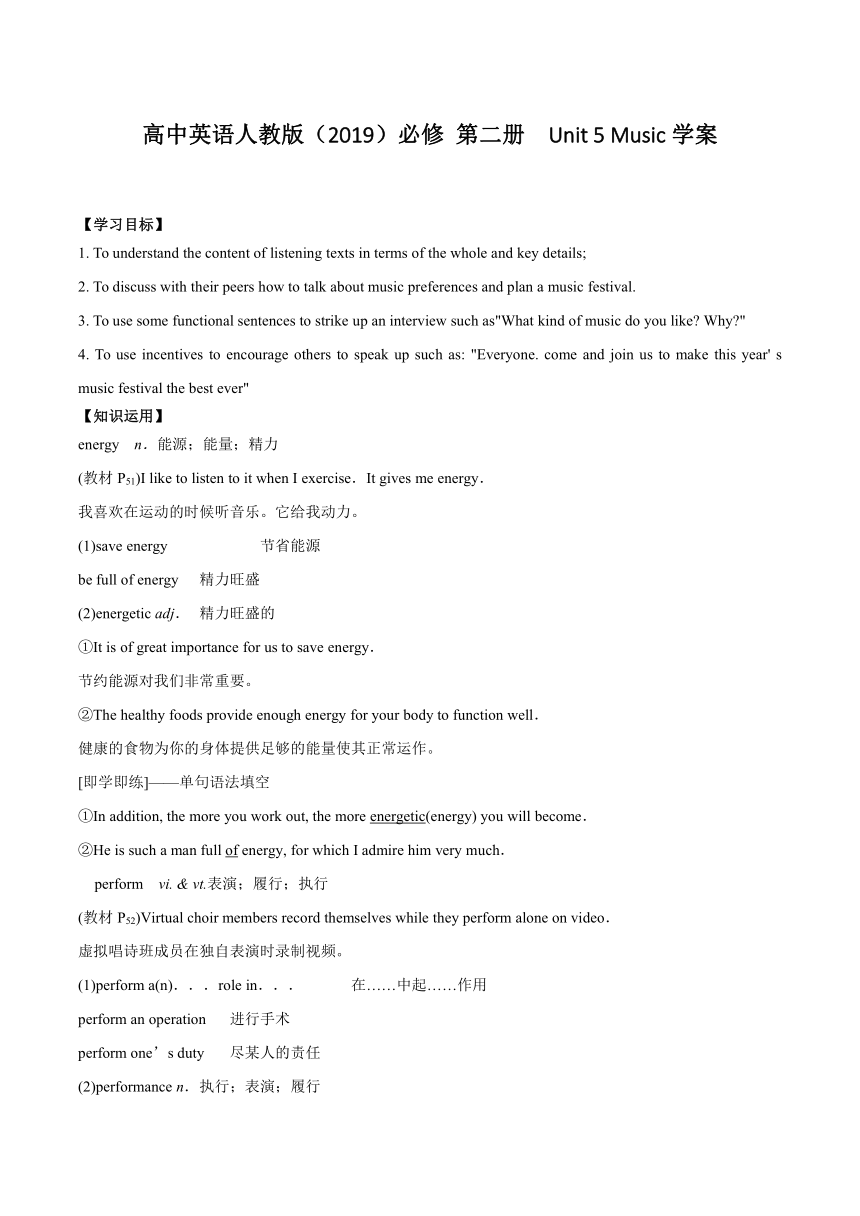 | |
| 格式 | docx | ||
| 文件大小 | 31.6KB | ||
| 资源类型 | 教案 | ||
| 版本资源 | 人教版(2019) | ||
| 科目 | 英语 | ||
| 更新时间 | 2022-01-18 15:09:35 | ||
图片预览

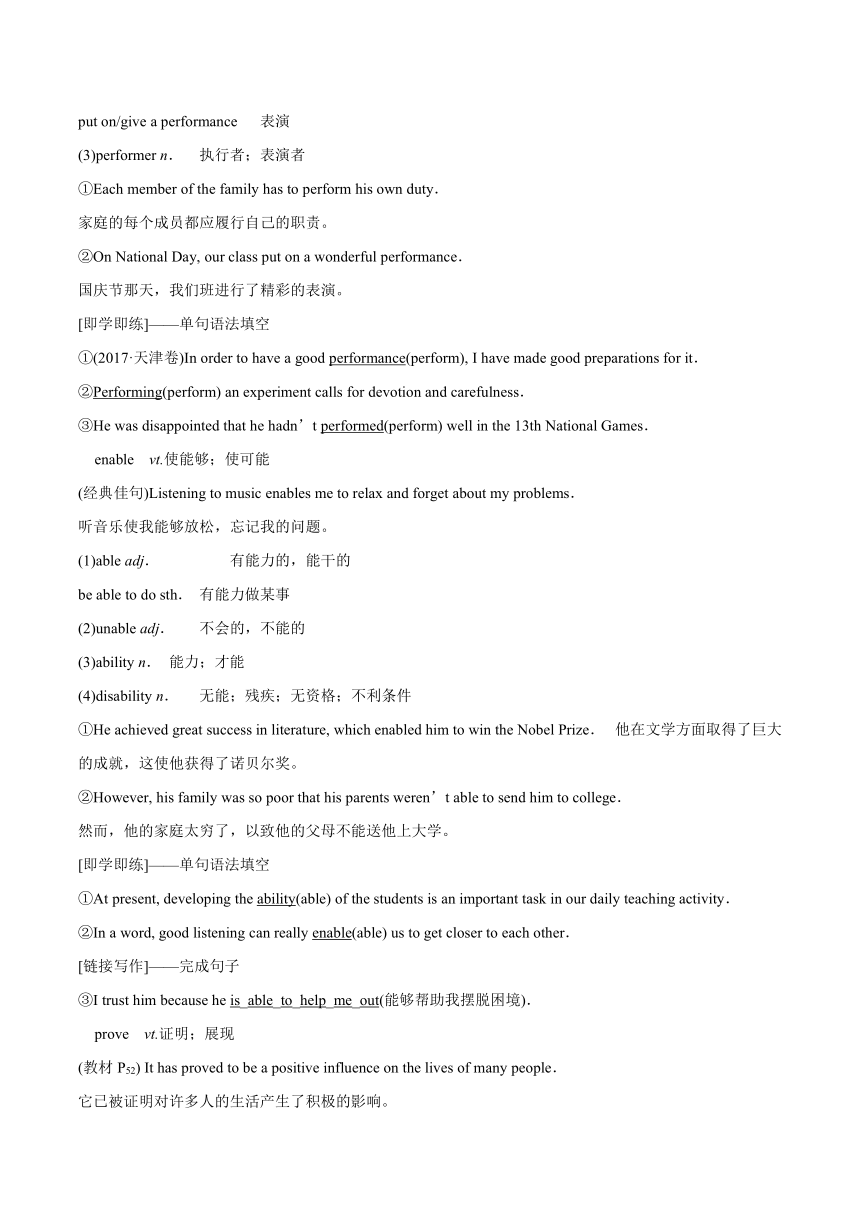
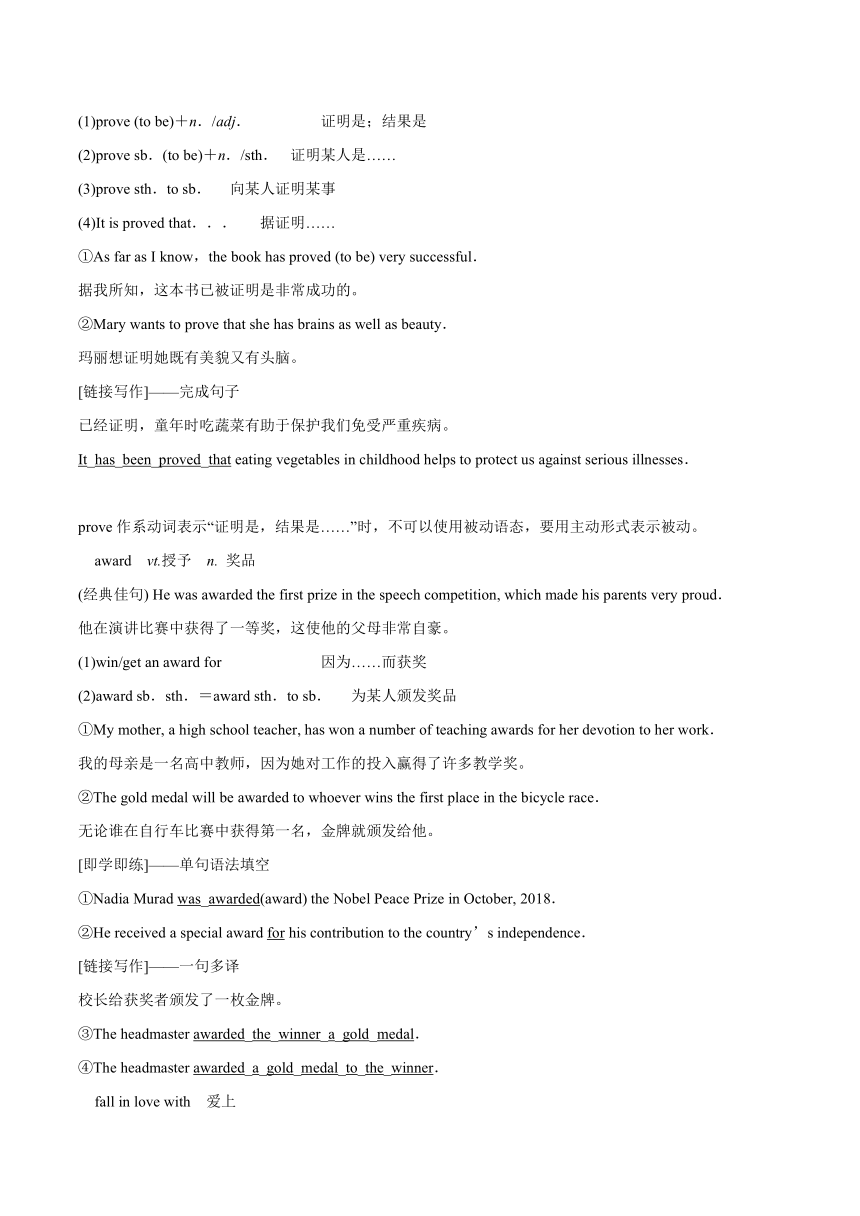
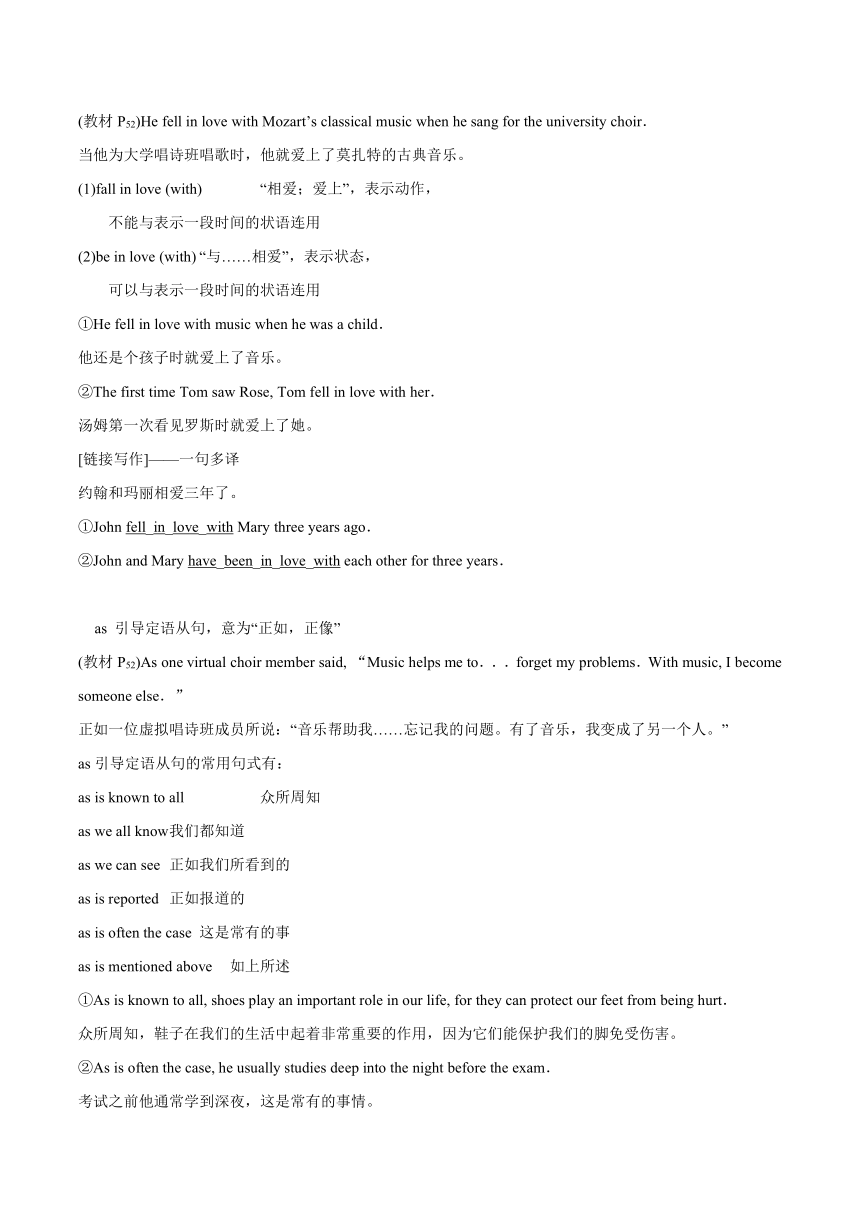
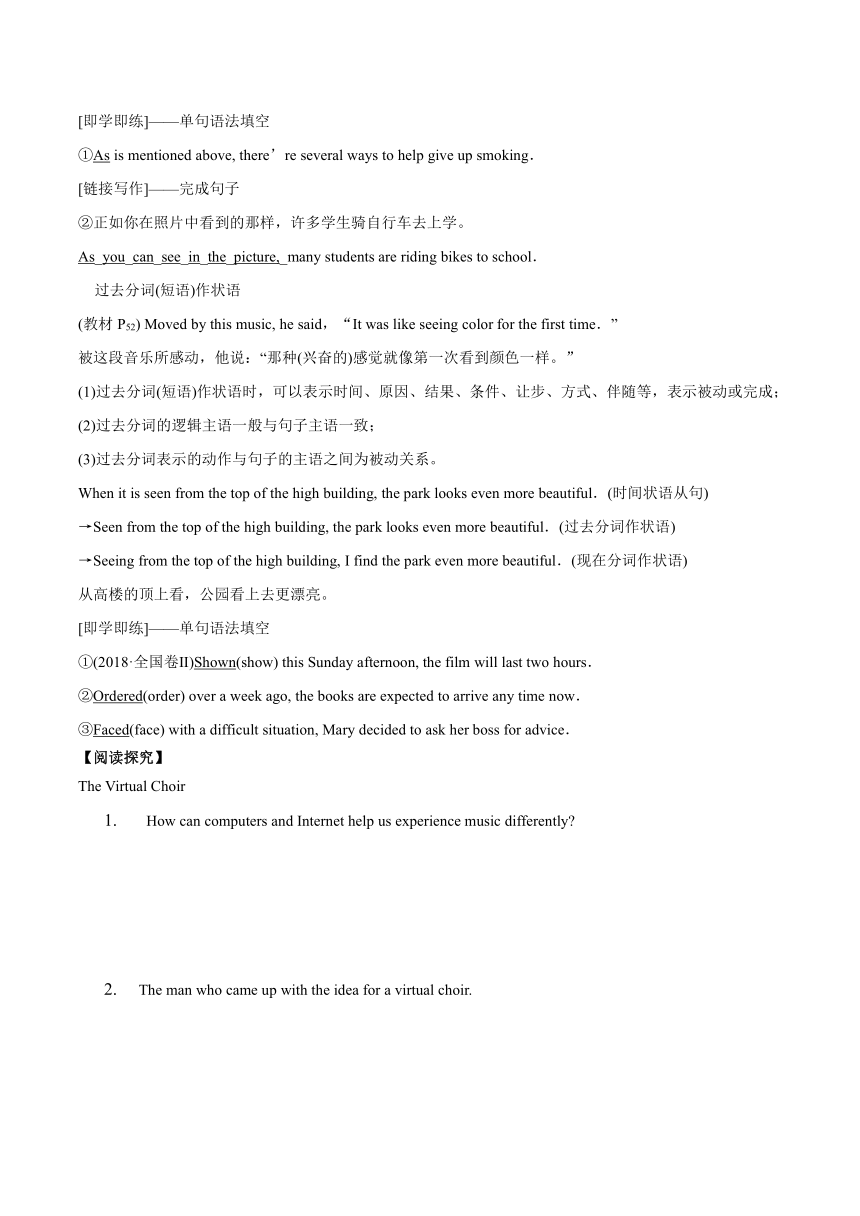
文档简介
高中英语人教版(2019)必修 第二册 Unit 5 Music学案
【学习目标】
1. To understand the content of listening texts in terms of the whole and key details;
2. To discuss with their peers how to talk about music preferences and plan a music festival.
3. To use some functional sentences to strike up an interview such as"What kind of music do you like Why "
4. To use incentives to encourage others to speak up such as: "e and join us to make this year' s music festival the best ever"
【知识运用】
energy n.能源;能量;精力
(教材P51)I like to listen to it when I exercise.It gives me energy.
我喜欢在运动的时候听音乐。它给我动力。
(1)save energy 节省能源
be full of energy 精力旺盛
(2)energetic adj. 精力旺盛的
①It is of great importance for us to save energy.
节约能源对我们非常重要。
②The healthy foods provide enough energy for your body to function well.
健康的食物为你的身体提供足够的能量使其正常运作。
[即学即练]——单句语法填空
①In addition, the more you work out, the more energetic(energy) you will become.
②He is such a man full of energy, for which I admire him very much.
perform vi. & vt.表演;履行;执行
(教材P52)Virtual choir members record themselves while they perform alone on video.
虚拟唱诗班成员在独自表演时录制视频。
(1)perform a(n)...role in... 在……中起……作用
perform an operation 进行手术
perform one’s duty 尽某人的责任
(2)performance n. 执行;表演;履行
put on/give a performance 表演
(3)performer n. 执行者;表演者
①Each member of the family has to perform his own duty.
家庭的每个成员都应履行自己的职责。
②On National Day, our class put on a wonderful performance.
国庆节那天,我们班进行了精彩的表演。
[即学即练]——单句语法填空
①(2017·天津卷)In order to have a good performance(perform), I have made good preparations for it.
②Performing(perform) an experiment calls for devotion and carefulness.
③He was disappointed that he hadn’t performed(perform) well in the 13th National Games.
enable vt.使能够;使可能
(经典佳句)Listening to music enables me to relax and forget about my problems.
听音乐使我能够放松,忘记我的问题。
(1)able adj. 有能力的,能干的
be able to do sth. 有能力做某事
(2)unable adj. 不会的,不能的
(3)ability n. 能力;才能
(4)disability n. 无能;残疾;无资格;不利条件
①He achieved great success in literature, which enabled him to win the Nobel Prize. 他在文学方面取得了巨大的成就,这使他获得了诺贝尔奖。
②However, his family was so poor that his parents weren’t able to send him to college.
然而,他的家庭太穷了,以致他的父母不能送他上大学。
[即学即练]——单句语法填空
①At present, developing the ability(able) of the students is an important task in our daily teaching activity.
②In a word, good listening can really enable(able) us to get closer to each other.
[链接写作]——完成句子
③I trust him because he is_able_to_help_me_out(能够帮助我摆脱困境).
prove vt.证明;展现
(教材P52) It has proved to be a positive influence on the lives of many people.
它已被证明对许多人的生活产生了积极的影响。
(1)prove (to be)+n./adj. 证明是;结果是
(2)prove sb.(to be)+n./sth. 证明某人是……
(3)prove sth.to sb. 向某人证明某事
(4)It is proved that... 据证明……
①As far as I know,the book has proved (to be) very successful.
据我所知,这本书已被证明是非常成功的。
②Mary wants to prove that she has brains as well as beauty.
玛丽想证明她既有美貌又有头脑。
[链接写作]——完成句子
已经证明,童年时吃蔬菜有助于保护我们免受严重疾病。
It_has_been_proved_that eating vegetables in childhood helps to protect us against serious illnesses.
prove作系动词表示“证明是,结果是……”时,不可以使用被动语态,要用主动形式表示被动。
award vt.授予 n. 奖品
(经典佳句) He was awarded the first prize in the speech competition, which made his parents very proud.
他在演讲比赛中获得了一等奖,这使他的父母非常自豪。
(1)win/get an award for 因为……而获奖
(2)award sb.sth.=award sth.to sb. 为某人颁发奖品
①My mother, a high school teacher, has won a number of teaching awards for her devotion to her work.
我的母亲是一名高中教师,因为她对工作的投入赢得了许多教学奖。
②The gold medal will be awarded to whoever wins the first place in the bicycle race.
无论谁在自行车比赛中获得第一名,金牌就颁发给他。
[即学即练]——单句语法填空
①Nadia Murad was_awarded(award) the Nobel Peace Prize in October, 2018.
②He received a special award for his contribution to the country’s independence.
[链接写作]——一句多译
校长给获奖者颁发了一枚金牌。
③The headmaster awarded_the_winner_a_gold_medal.
④The headmaster awarded_a_gold_medal_to_the_winner.
fall in love with 爱上
(教材P52)He fell in love with Mozart’s classical music when he sang for the university choir.
当他为大学唱诗班唱歌时,他就爱上了莫扎特的古典音乐。
(1)fall in love (with) “相爱;爱上”,表示动作,
不能与表示一段时间的状语连用
(2)be in love (with) “与……相爱”,表示状态,
可以与表示一段时间的状语连用
①He fell in love with music when he was a child.
他还是个孩子时就爱上了音乐。
②The first time Tom saw Rose, Tom fell in love with her.
汤姆第一次看见罗斯时就爱上了她。
[链接写作]——一句多译
约翰和玛丽相爱三年了。
①John fell_in_love_with Mary three years ago.
②John and Mary have_been_in_love_with each other for three years.
as 引导定语从句,意为“正如,正像”
(教材P52)As one virtual choir member said, “Music helps me to...forget my problems.With music, I become someone else.”
正如一位虚拟唱诗班成员所说:“音乐帮助我……忘记我的问题。有了音乐,我变成了另一个人。”
as引导定语从句的常用句式有:
as is known to all 众所周知
as we all know 我们都知道
as we can see 正如我们所看到的
as is reported 正如报道的
as is often the case 这是常有的事
as is mentioned above 如上所述
①As is known to all, shoes play an important role in our life, for they can protect our feet from being hurt.
众所周知,鞋子在我们的生活中起着非常重要的作用,因为它们能保护我们的脚免受伤害。
②As is often the case, he usually studies deep into the night before the exam.
考试之前他通常学到深夜,这是常有的事情。
[即学即练]——单句语法填空
①As is mentioned above, there’re several ways to help give up smoking.
[链接写作]——完成句子
②正如你在照片中看到的那样,许多学生骑自行车去上学。
As_you_can_see_in_the_picture,_many students are riding bikes to school.
过去分词(短语)作状语
(教材P52) Moved by this music, he said,“It was like seeing color for the first time.”
被这段音乐所感动,他说:“那种(兴奋的)感觉就像第一次看到颜色一样。”
(1)过去分词(短语)作状语时,可以表示时间、原因、结果、条件、让步、方式、伴随等,表示被动或完成;
(2)过去分词的逻辑主语一般与句子主语一致;
(3)过去分词表示的动作与句子的主语之间为被动关系。
When it is seen from the top of the high building, the park looks even more beautiful.(时间状语从句)
→Seen from the top of the high building, the park looks even more beautiful.(过去分词作状语)
→Seeing from the top of the high building, I find the park even more beautiful.(现在分词作状语)
从高楼的顶上看,公园看上去更漂亮。
[即学即练]——单句语法填空
①(2018·全国卷Ⅱ)Shown(show) this Sunday afternoon, the film will last two hours.
②Ordered(order) over a week ago, the books are expected to arrive any time now.
③Faced(face) with a difficult situation, Mary decided to ask her boss for advice.
【阅读探究】
The Virtual Choir
How can computers and Internet help us experience music differently
The man who came up with the idea for a virtual choir.
The place where he studies musical composition.
The name of his song.
【句型梳理】
Imagine having the opportunity to sing together with hundreds of other people while you are at home alone.想象一下,当你独自一人在家的时候,有机会和数百人一起唱歌。
本句是祈使句,动名词短语“having the opportunity..”是imagine的宾语。
祈使句
(1)祈使句表请求、命令、叮嘱、劝告等,以动词原形形式出现。祈使
句的主语you,通常省略。有时加呼语,以便指明发出命令。
Mary,clean the windows,and you boys,sweep the floor!
玛丽,擦窗户,你们男孩子拖地板!
(2)“祈使句+and/or+陈述句”结构,祈使句表示条件,陈述句表示结
果,其谓语常用一般将来时。
Tum the heat down or it'll burn.(=If you don't turn the heat down,it'll burn.)
把炉火开小一些,不然就烧焦了。
(3)“名词短语+and/or+陈述句”结构,名词短语是省略的祈使句。
A little more efforts,and you will make it.再努力一点,你就会成功的。
(4)祈使句的强调形式:do+动词原形。
Do give my regards to your parents!务必代我向你父母问好!
(5)当祈使句由直接引语变成间接引语时,常用“ask/request/tell/order sb.(not)to do sth.”结构。
“Speak loudly,please!"the teacher said to me.“请大声说话!”老师对我说。
The teacher asked me to speak loudly.老师要我大声说话。
2. The virtual choir is a wonderful way for ole around the world to sing with one voice and thus make the world Aeter place.虚拟合唱团是全世界人们用同一个声音唱歌的好方法,从后使世界变得更好。
本句是简单句,way后面接不定式做定语;make the world a better place表示“使世界成为更美好的地方”,名词短语a better place做宾语补足语。
“make+宾语+宾语补足语”结构
此结构中,宾语补足语可以由名词、形容词、过去分词、不定式等来充当。
Walking in the park can make us happy and healthy.(形容词做宾语补足语)在公园里散步可以使我们快乐、身体健康。
His pay has been raised,so we made him treat us to a dinner.(省略to的动词不定式做宾语补足语)他的工资涨了,因此我们让他请我们吃一顿饭。
He purposely raised his voice to make himself heard by all the people present.(过去分词做宾语补足语)他有意提高嗓音,以使在场的每个人都能听到他的话。
We made him chairman of our English Speaking Society.(名词做宾语补足语)我们选他当英语会话社主席。
特别注意
(1)该结构中不用现在分词充当宾语补足语。
(2)表示职务名词,如manager,monitor,captain,president等充当宾语补足语时,其前面不要加冠词。
(3)有时形容词做宾语补足语时,可用it做形式宾语,构成“make+it+形容词(posible/clear)+真正宾语(不定式/hat从句)”结构。
Ta like to make it clear that I had nothing to do with this.
我想明确地说明我和这事没关系。
(4)此结构变被动语态时,宾语补足语就变成主语补足语,不定式前必须加to,其他宾语补足语形式不变
He was made to do his homework again by his mother.
他被他妈妈要求把他的家庭作业重做一次。
【语法解析】
过去分词(短语)作状语
表示被动的或完成的动作,这时句子的主语和过去分词之间为逻辑上的被动关系。而现在分词(短语)作状语时,现在分词的动作就是句子主语的动作,它们之间的关系是主动关系。
Written in a hurry,this article was not so good.
因为写得匆忙,这篇文章不是很好。
本句中的witen即为过去分词作状语,表示这篇文章是被写的,而且已经被写完。过去分词
(短语)通常在句中作时间状语、原因状语、条件状语、让步状语、方式状语和伴随状语等。
1.过去分词作时间状语,在句中相当于一一个时间状语从句。
Asked about his address(= When he was asked about his address),the boy didn’t respond.
问及他的地址时,小男孩没有作答。
2.过去分词作原因状语,在句中相当于一个原因状语从句。
Encouraged by the progress he has made(= As he is encouraged by the progress he has made),he works harder.由于受到所取得的成绩的鼓励,他工作更努力了。
3.过去分词作条件状语,在句中相当于一个条件状语从句。
Given more time(= If they were given more time),the trees could grow taller.
如果再多给一点时间,这些树会长得更高。
Heated to a high temperature(= If it is heated to a high temperature),water will change into vapor.
如果加热到高温,水就能变成蒸气。
4.过去分词作让步状语,在句中相当于-一个让步状语从句。
Left(Although he was left)at home,John didn’t feel afraid at all.
虽然约翰被单独留在房间里,但他---点都不害怕。
5.过去分词作方式、伴随状语。
Followed by a group of students,the teacher entered the classoom.
= The teacher entered the classroom and he was followed by a group of students.
老师走进教室,后面跟着一群学生。
注意:(1)过去分词(短语)作状语时,前面有时可以加上when,if,while,though,even if,until,unless 等连词,这种结构可以看作是一种省略的状语从句(省略部分多为“主语+ be的多种形式”)。需要注意的是,省略的主语必须和主句的主语相同或是it。
Even ifinvited(= Even ifI'm invited),I won’t take part in the party即使受到邀请,我也不会参加这个聚会的。
拓展:有些过去分词因来源于系表结构,作状语时不表被动而表主动。这样的过去分词及短
语常见的有:lost 迷路,沉溺于;seated 坐;dressedin 穿着;tired of厌烦;faced with面临;accustomed to习惯于等。
Lost in deep thought,he didn't hear the sound.
因为沉溺于思考之中,所以他没听到那个声音。
Dressed in a new dress,she looks very beautiful.
穿着一件新衣服,她看上去很漂亮。
(2)现在分词(短语)在句中也可以作状语来修饰谓语动词或整个句子,表示动作发生的时间、原因、条件、结果、方式、让步或伴随状况。
Walking in the park,she saw an old frend.
= When/While(she was)walking in the park,she saw an old friend.
当她在公园里散步时,她看到了她的一个老朋友。
Being il,he couldn't go to school.
= As he was ill,he couldn't go to school.
因为生病了,他无法去上学。
Working hard,you'II make great progress.
= If you work hard,you'II make great progress.
如果你努力工作,你将取得很大进步。
The hospital has recently obtained new medical equipment,allowing more patients to be treated.
这家医院最近得到一批新的医疗设备,这使更多的病人能得到治疗。
Mary sat by the window of the classroom,reading a book.
= Mary sat by the window of the classroom and was reading a book.
玛丽坐在教室的窗边读一本书。
(3)不定式(短语)在句中也可以作状语,表示目的或结果。
To catch the first bus,he got up very early.
为了赶第一班公交车,他起得很早。
I hurried to school,only to find it was Sunday.
我匆忙赶到学校,结果发现是星期天。
【巩固练习】
1.The majority of citizens consider an _____ (普通的) job boring or even valueless.
2.I'd like to take this _____ (机会) to thank my colleagues for their support.
3.New technology has _____ (使可能) the development of an online “virtual library”.
4.I tried ringing you several times yesterday but I couldn't get _____ to you.
5.From then _____, I grew rapidly both in size and in brainpower.
6._____ addition to natural rivers, the Chinese working people have dug many canals.
7.We won't know how the plan works till we have tried it _____.
8.After years of regular _____ (treat), she finally became healthy.
9.The government has an interest in importing scientific ___________(equip).
10._____ (assume) you are right, we'll make a great deal of money from the project.
参考答案
1.答案:ordinary
解析:
2.答案:opportunity
解析:
3.答案:enabled
解析:
4.答案:through
解析:
5.答案:on
解析:此处考查固定搭配from then on, 意为"从那时起"。句意为: 从那时起, 我在体型和脑力方面迅速成长。
6.答案:In
解析:
7.答案:out
解析:
8.答案:treatment
解析:
9.答案:equipment
解析:
10.答案:Assuming
解析:
【学习目标】
1. To understand the content of listening texts in terms of the whole and key details;
2. To discuss with their peers how to talk about music preferences and plan a music festival.
3. To use some functional sentences to strike up an interview such as"What kind of music do you like Why "
4. To use incentives to encourage others to speak up such as: "e and join us to make this year' s music festival the best ever"
【知识运用】
energy n.能源;能量;精力
(教材P51)I like to listen to it when I exercise.It gives me energy.
我喜欢在运动的时候听音乐。它给我动力。
(1)save energy 节省能源
be full of energy 精力旺盛
(2)energetic adj. 精力旺盛的
①It is of great importance for us to save energy.
节约能源对我们非常重要。
②The healthy foods provide enough energy for your body to function well.
健康的食物为你的身体提供足够的能量使其正常运作。
[即学即练]——单句语法填空
①In addition, the more you work out, the more energetic(energy) you will become.
②He is such a man full of energy, for which I admire him very much.
perform vi. & vt.表演;履行;执行
(教材P52)Virtual choir members record themselves while they perform alone on video.
虚拟唱诗班成员在独自表演时录制视频。
(1)perform a(n)...role in... 在……中起……作用
perform an operation 进行手术
perform one’s duty 尽某人的责任
(2)performance n. 执行;表演;履行
put on/give a performance 表演
(3)performer n. 执行者;表演者
①Each member of the family has to perform his own duty.
家庭的每个成员都应履行自己的职责。
②On National Day, our class put on a wonderful performance.
国庆节那天,我们班进行了精彩的表演。
[即学即练]——单句语法填空
①(2017·天津卷)In order to have a good performance(perform), I have made good preparations for it.
②Performing(perform) an experiment calls for devotion and carefulness.
③He was disappointed that he hadn’t performed(perform) well in the 13th National Games.
enable vt.使能够;使可能
(经典佳句)Listening to music enables me to relax and forget about my problems.
听音乐使我能够放松,忘记我的问题。
(1)able adj. 有能力的,能干的
be able to do sth. 有能力做某事
(2)unable adj. 不会的,不能的
(3)ability n. 能力;才能
(4)disability n. 无能;残疾;无资格;不利条件
①He achieved great success in literature, which enabled him to win the Nobel Prize. 他在文学方面取得了巨大的成就,这使他获得了诺贝尔奖。
②However, his family was so poor that his parents weren’t able to send him to college.
然而,他的家庭太穷了,以致他的父母不能送他上大学。
[即学即练]——单句语法填空
①At present, developing the ability(able) of the students is an important task in our daily teaching activity.
②In a word, good listening can really enable(able) us to get closer to each other.
[链接写作]——完成句子
③I trust him because he is_able_to_help_me_out(能够帮助我摆脱困境).
prove vt.证明;展现
(教材P52) It has proved to be a positive influence on the lives of many people.
它已被证明对许多人的生活产生了积极的影响。
(1)prove (to be)+n./adj. 证明是;结果是
(2)prove sb.(to be)+n./sth. 证明某人是……
(3)prove sth.to sb. 向某人证明某事
(4)It is proved that... 据证明……
①As far as I know,the book has proved (to be) very successful.
据我所知,这本书已被证明是非常成功的。
②Mary wants to prove that she has brains as well as beauty.
玛丽想证明她既有美貌又有头脑。
[链接写作]——完成句子
已经证明,童年时吃蔬菜有助于保护我们免受严重疾病。
It_has_been_proved_that eating vegetables in childhood helps to protect us against serious illnesses.
prove作系动词表示“证明是,结果是……”时,不可以使用被动语态,要用主动形式表示被动。
award vt.授予 n. 奖品
(经典佳句) He was awarded the first prize in the speech competition, which made his parents very proud.
他在演讲比赛中获得了一等奖,这使他的父母非常自豪。
(1)win/get an award for 因为……而获奖
(2)award sb.sth.=award sth.to sb. 为某人颁发奖品
①My mother, a high school teacher, has won a number of teaching awards for her devotion to her work.
我的母亲是一名高中教师,因为她对工作的投入赢得了许多教学奖。
②The gold medal will be awarded to whoever wins the first place in the bicycle race.
无论谁在自行车比赛中获得第一名,金牌就颁发给他。
[即学即练]——单句语法填空
①Nadia Murad was_awarded(award) the Nobel Peace Prize in October, 2018.
②He received a special award for his contribution to the country’s independence.
[链接写作]——一句多译
校长给获奖者颁发了一枚金牌。
③The headmaster awarded_the_winner_a_gold_medal.
④The headmaster awarded_a_gold_medal_to_the_winner.
fall in love with 爱上
(教材P52)He fell in love with Mozart’s classical music when he sang for the university choir.
当他为大学唱诗班唱歌时,他就爱上了莫扎特的古典音乐。
(1)fall in love (with) “相爱;爱上”,表示动作,
不能与表示一段时间的状语连用
(2)be in love (with) “与……相爱”,表示状态,
可以与表示一段时间的状语连用
①He fell in love with music when he was a child.
他还是个孩子时就爱上了音乐。
②The first time Tom saw Rose, Tom fell in love with her.
汤姆第一次看见罗斯时就爱上了她。
[链接写作]——一句多译
约翰和玛丽相爱三年了。
①John fell_in_love_with Mary three years ago.
②John and Mary have_been_in_love_with each other for three years.
as 引导定语从句,意为“正如,正像”
(教材P52)As one virtual choir member said, “Music helps me to...forget my problems.With music, I become someone else.”
正如一位虚拟唱诗班成员所说:“音乐帮助我……忘记我的问题。有了音乐,我变成了另一个人。”
as引导定语从句的常用句式有:
as is known to all 众所周知
as we all know 我们都知道
as we can see 正如我们所看到的
as is reported 正如报道的
as is often the case 这是常有的事
as is mentioned above 如上所述
①As is known to all, shoes play an important role in our life, for they can protect our feet from being hurt.
众所周知,鞋子在我们的生活中起着非常重要的作用,因为它们能保护我们的脚免受伤害。
②As is often the case, he usually studies deep into the night before the exam.
考试之前他通常学到深夜,这是常有的事情。
[即学即练]——单句语法填空
①As is mentioned above, there’re several ways to help give up smoking.
[链接写作]——完成句子
②正如你在照片中看到的那样,许多学生骑自行车去上学。
As_you_can_see_in_the_picture,_many students are riding bikes to school.
过去分词(短语)作状语
(教材P52) Moved by this music, he said,“It was like seeing color for the first time.”
被这段音乐所感动,他说:“那种(兴奋的)感觉就像第一次看到颜色一样。”
(1)过去分词(短语)作状语时,可以表示时间、原因、结果、条件、让步、方式、伴随等,表示被动或完成;
(2)过去分词的逻辑主语一般与句子主语一致;
(3)过去分词表示的动作与句子的主语之间为被动关系。
When it is seen from the top of the high building, the park looks even more beautiful.(时间状语从句)
→Seen from the top of the high building, the park looks even more beautiful.(过去分词作状语)
→Seeing from the top of the high building, I find the park even more beautiful.(现在分词作状语)
从高楼的顶上看,公园看上去更漂亮。
[即学即练]——单句语法填空
①(2018·全国卷Ⅱ)Shown(show) this Sunday afternoon, the film will last two hours.
②Ordered(order) over a week ago, the books are expected to arrive any time now.
③Faced(face) with a difficult situation, Mary decided to ask her boss for advice.
【阅读探究】
The Virtual Choir
How can computers and Internet help us experience music differently
The man who came up with the idea for a virtual choir.
The place where he studies musical composition.
The name of his song.
【句型梳理】
Imagine having the opportunity to sing together with hundreds of other people while you are at home alone.想象一下,当你独自一人在家的时候,有机会和数百人一起唱歌。
本句是祈使句,动名词短语“having the opportunity..”是imagine的宾语。
祈使句
(1)祈使句表请求、命令、叮嘱、劝告等,以动词原形形式出现。祈使
句的主语you,通常省略。有时加呼语,以便指明发出命令。
Mary,clean the windows,and you boys,sweep the floor!
玛丽,擦窗户,你们男孩子拖地板!
(2)“祈使句+and/or+陈述句”结构,祈使句表示条件,陈述句表示结
果,其谓语常用一般将来时。
Tum the heat down or it'll burn.(=If you don't turn the heat down,it'll burn.)
把炉火开小一些,不然就烧焦了。
(3)“名词短语+and/or+陈述句”结构,名词短语是省略的祈使句。
A little more efforts,and you will make it.再努力一点,你就会成功的。
(4)祈使句的强调形式:do+动词原形。
Do give my regards to your parents!务必代我向你父母问好!
(5)当祈使句由直接引语变成间接引语时,常用“ask/request/tell/order sb.(not)to do sth.”结构。
“Speak loudly,please!"the teacher said to me.“请大声说话!”老师对我说。
The teacher asked me to speak loudly.老师要我大声说话。
2. The virtual choir is a wonderful way for ole around the world to sing with one voice and thus make the world Aeter place.虚拟合唱团是全世界人们用同一个声音唱歌的好方法,从后使世界变得更好。
本句是简单句,way后面接不定式做定语;make the world a better place表示“使世界成为更美好的地方”,名词短语a better place做宾语补足语。
“make+宾语+宾语补足语”结构
此结构中,宾语补足语可以由名词、形容词、过去分词、不定式等来充当。
Walking in the park can make us happy and healthy.(形容词做宾语补足语)在公园里散步可以使我们快乐、身体健康。
His pay has been raised,so we made him treat us to a dinner.(省略to的动词不定式做宾语补足语)他的工资涨了,因此我们让他请我们吃一顿饭。
He purposely raised his voice to make himself heard by all the people present.(过去分词做宾语补足语)他有意提高嗓音,以使在场的每个人都能听到他的话。
We made him chairman of our English Speaking Society.(名词做宾语补足语)我们选他当英语会话社主席。
特别注意
(1)该结构中不用现在分词充当宾语补足语。
(2)表示职务名词,如manager,monitor,captain,president等充当宾语补足语时,其前面不要加冠词。
(3)有时形容词做宾语补足语时,可用it做形式宾语,构成“make+it+形容词(posible/clear)+真正宾语(不定式/hat从句)”结构。
Ta like to make it clear that I had nothing to do with this.
我想明确地说明我和这事没关系。
(4)此结构变被动语态时,宾语补足语就变成主语补足语,不定式前必须加to,其他宾语补足语形式不变
He was made to do his homework again by his mother.
他被他妈妈要求把他的家庭作业重做一次。
【语法解析】
过去分词(短语)作状语
表示被动的或完成的动作,这时句子的主语和过去分词之间为逻辑上的被动关系。而现在分词(短语)作状语时,现在分词的动作就是句子主语的动作,它们之间的关系是主动关系。
Written in a hurry,this article was not so good.
因为写得匆忙,这篇文章不是很好。
本句中的witen即为过去分词作状语,表示这篇文章是被写的,而且已经被写完。过去分词
(短语)通常在句中作时间状语、原因状语、条件状语、让步状语、方式状语和伴随状语等。
1.过去分词作时间状语,在句中相当于一一个时间状语从句。
Asked about his address(= When he was asked about his address),the boy didn’t respond.
问及他的地址时,小男孩没有作答。
2.过去分词作原因状语,在句中相当于一个原因状语从句。
Encouraged by the progress he has made(= As he is encouraged by the progress he has made),he works harder.由于受到所取得的成绩的鼓励,他工作更努力了。
3.过去分词作条件状语,在句中相当于一个条件状语从句。
Given more time(= If they were given more time),the trees could grow taller.
如果再多给一点时间,这些树会长得更高。
Heated to a high temperature(= If it is heated to a high temperature),water will change into vapor.
如果加热到高温,水就能变成蒸气。
4.过去分词作让步状语,在句中相当于-一个让步状语从句。
Left(Although he was left)at home,John didn’t feel afraid at all.
虽然约翰被单独留在房间里,但他---点都不害怕。
5.过去分词作方式、伴随状语。
Followed by a group of students,the teacher entered the classoom.
= The teacher entered the classroom and he was followed by a group of students.
老师走进教室,后面跟着一群学生。
注意:(1)过去分词(短语)作状语时,前面有时可以加上when,if,while,though,even if,until,unless 等连词,这种结构可以看作是一种省略的状语从句(省略部分多为“主语+ be的多种形式”)。需要注意的是,省略的主语必须和主句的主语相同或是it。
Even ifinvited(= Even ifI'm invited),I won’t take part in the party即使受到邀请,我也不会参加这个聚会的。
拓展:有些过去分词因来源于系表结构,作状语时不表被动而表主动。这样的过去分词及短
语常见的有:lost 迷路,沉溺于;seated 坐;dressedin 穿着;tired of厌烦;faced with面临;accustomed to习惯于等。
Lost in deep thought,he didn't hear the sound.
因为沉溺于思考之中,所以他没听到那个声音。
Dressed in a new dress,she looks very beautiful.
穿着一件新衣服,她看上去很漂亮。
(2)现在分词(短语)在句中也可以作状语来修饰谓语动词或整个句子,表示动作发生的时间、原因、条件、结果、方式、让步或伴随状况。
Walking in the park,she saw an old frend.
= When/While(she was)walking in the park,she saw an old friend.
当她在公园里散步时,她看到了她的一个老朋友。
Being il,he couldn't go to school.
= As he was ill,he couldn't go to school.
因为生病了,他无法去上学。
Working hard,you'II make great progress.
= If you work hard,you'II make great progress.
如果你努力工作,你将取得很大进步。
The hospital has recently obtained new medical equipment,allowing more patients to be treated.
这家医院最近得到一批新的医疗设备,这使更多的病人能得到治疗。
Mary sat by the window of the classroom,reading a book.
= Mary sat by the window of the classroom and was reading a book.
玛丽坐在教室的窗边读一本书。
(3)不定式(短语)在句中也可以作状语,表示目的或结果。
To catch the first bus,he got up very early.
为了赶第一班公交车,他起得很早。
I hurried to school,only to find it was Sunday.
我匆忙赶到学校,结果发现是星期天。
【巩固练习】
1.The majority of citizens consider an _____ (普通的) job boring or even valueless.
2.I'd like to take this _____ (机会) to thank my colleagues for their support.
3.New technology has _____ (使可能) the development of an online “virtual library”.
4.I tried ringing you several times yesterday but I couldn't get _____ to you.
5.From then _____, I grew rapidly both in size and in brainpower.
6._____ addition to natural rivers, the Chinese working people have dug many canals.
7.We won't know how the plan works till we have tried it _____.
8.After years of regular _____ (treat), she finally became healthy.
9.The government has an interest in importing scientific ___________(equip).
10._____ (assume) you are right, we'll make a great deal of money from the project.
参考答案
1.答案:ordinary
解析:
2.答案:opportunity
解析:
3.答案:enabled
解析:
4.答案:through
解析:
5.答案:on
解析:此处考查固定搭配from then on, 意为"从那时起"。句意为: 从那时起, 我在体型和脑力方面迅速成长。
6.答案:In
解析:
7.答案:out
解析:
8.答案:treatment
解析:
9.答案:equipment
解析:
10.答案:Assuming
解析:
